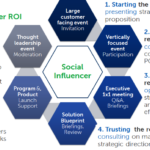An Inside Look at Dell's Influencer Program
 In the last few years, a number of brands have realized that to earning the trust of consumers isn’t something they’ll be able to accomplish on their own. The reality is that people trust people more than brands, which explains the emergence of influencer marketing. Instead of going straight to their target market, brands are now looking to a chosen few individuals to augment their message and promote their products. Influencer marketing programs have stepped boldly onto the scene and have set up shop in B2C and B2B environments.
In the last few years, a number of brands have realized that to earning the trust of consumers isn’t something they’ll be able to accomplish on their own. The reality is that people trust people more than brands, which explains the emergence of influencer marketing. Instead of going straight to their target market, brands are now looking to a chosen few individuals to augment their message and promote their products. Influencer marketing programs have stepped boldly onto the scene and have set up shop in B2C and B2B environments.
In my book The CMO’s Periodic Table, I interviewed former IBM VP of Marketing and the architect of their B2B influencer program, Tami Cannizzaro. In Tami’s words, the point of such programs is to connect with notable people in the target industry and “make these people part of your overall strategy, treat them like VIPs and give them insider access to your strategy or brand.” Influencers get a seat at your company’s table, and become the voice of your brand for the thousands of people who consume their content.
During the Incite Group’s Corporate Social Media Summit, I had the pleasure of continuing this conversation with Konnie Alex Brown who specifically oversees Dell’s influencer relations. I talked to Konnie about the skills and strategies she deploys to make sure Dell’s influencer campaigns are mutually beneficial for the company and the influencer. Speaking with her not only gave me an in-depth look at the inner workings of a brand/ influencer partnership, it further proved the value that such relationships bring to both the brand and the influencer.
Drew: You’ve been at Dell for +9 years. Talk to me a bit about how your various jobs at Dell set you up for our current one and the skills you need to succeed at running social influencer relations?
Konnie: My experience leading corporate and executive sales and technology communications at Dell have had a foundational role in preparing me to design corporate social influencer programs that reflect Dell’s customer focus, business priorities and long-term strategic vision. Understanding a company’s history and being plugged in to the right news streams and networks within a company of Dell’s size is fundamental in building a social influencer program that creates value for the business, as well as for the social influencer. Understanding the dynamic and nuances of shared value creation is indispensable to be successful in a business-to-business environment.
Drew: Can you give a specific example of an influencer you are working with? How did decide on this individual and what did the program look like?
Konnie: Sure, Drew. I have recently developed a blue print for working with a social influencer focused on Dell’s IoT solutions. This particular B2B example is exciting as it describes the path and evolution of the relationship leading to tangible ROI for Dell and for the influencer and, very important, it is repeatable. This case study also clearly shows the need for company internal collaboration across teams to achieve maximum value. It is important to note that this process will take time and dedication just like any initiative that involves building trust-based, human relationships. Think of it as ‘dating’ where the brand (but really a human representative of the brand) and the social influencer get to know each other.
Take a look at the blueprint for building a relationship based on increasingly more information sharing and trust building via carefully chosen and designed touch points.

Let’s start at the beginning. Following the identification and pre “first date” vetting of the social influencer, we begin with building the relationship by inviting him or her to a first meeting, ideally an event where both parties can find out about goals, capabilities and business priorities. Over the course of additional touch points, designed to uncover the value for the brand and the influencer, the evaluation to deepen and nurture the relationship (think months, not days) can be made. Once a mutual level of trust has been established, the depth of information sharing and authentic, mutual endorsement can take place without compromising the influencer’s independence of voice. It is also important to note that there will be ongoing assessment of the relationship’s value – from both sides.
Drew: What does Dell hope to get out of the relationship? How do you measure success? (feel free to share how long it can take)
Konnie: Great question, Drew. Let’s talk about the mutual value that a long-term, trust-based relationship creates for the Dell brand and the influencer. Dell seeks to help the influencer understand our purpose, customer commitment and value proposition by sharing our strategy, technology POVs and details about current and future plans to meet and anticipate customer business needs. The value for Dell clearly lies in expanding our audience each to raise awareness and educate the social influencer’s audience about the Dell value proposition in an authentic way for future consideration and action. We constantly monitor the value of the content in terms of frequency, authenticity, subject matter expertise, preserved independence of opinion, social engagement and reach as well as dynamics, such as leadership and interactivity, at in-person events.
Drew: Let’s talk about the value exchange here. What’s in it for the influencer and how do make sure that persons is getting what they want out of the relationship?
Konnie: The value of the relationship for the influencer resides in several areas and may vary dependent on the influencer’s particular goals. In general, however, the value resides in gaining insights into Dell’s technology strategy, particular POVs, future plans as well as access to customers and partners of Dell. This information access allows the influencer to deliver insightful, trust-worthy content to his or her audience and, with that, increase his audience, trusted status among them and his or her relevance in the industry.
Drew: How important is it that you personally have relationships with the influencers? Is this something you can outsource and if not, why not?
Konnie: Dell’s social influencer programs are built on the premise that relationships are owned, maintained and nurtured by Dell via frequent virtual touch points and white glove experiences via in-person meetings or events throughout the year. To answer your question, Dell’s point of view is that these relationships, due to their long-term, trust and value-based nature, cannot be outsourced. Aspects of social influencer identification, logistics and measuring processes, however, can well be handled by an agency.